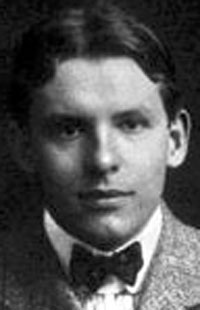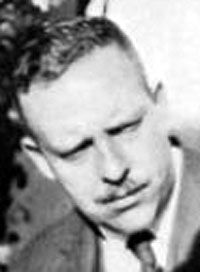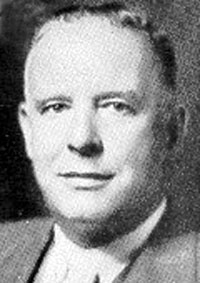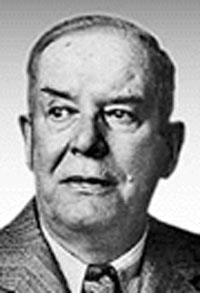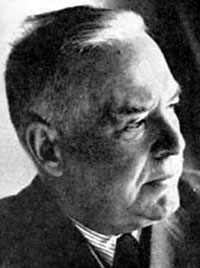Wallace Stevens
Copyright Michael D. Robbins 2005
Astro-Rayological
Interpretation & Charts
Quotes
Biography
Images and Physiognomic Interpretation
A poet looks at the world the way a man looks at a woman.
All the great things have been denied and we live in an intricacy of new and local mythologies, political, economic, poetic, which are asserted with an ever-enlarging incoherence.
Civilization must be destroyed. The hairy saints of the North have earned this crumb by their complaints.
Democritus plucked his eye out because he could not look at a woman without thinking of her as a woman. If he had read a few of our novels, he would have torn himself to pieces.
Intolerance respecting other people's religion is toleration itself in comparison with intolerance respecting other people's art.
It is the unknown that excites the ardor of scholars, who, in the known alone, would shrivel up with boredom.
Money is a kind of poetry.
Most modern reproducers of life, even including the camera, really repudiate it. We gulp down evil, choke at good.
One cannot spend one's time in being modern when there are so many more important things to be.
Perhaps the truth depends on a walk around the lake.
Style is not something applied. It is something that permeates. It is of the nature of that in which it is found, whether the poem, the manner of a god, the bearing of a man. It is not a dress.
The genuine artist is never "true to life." He sees what is real, but not as we are normally aware of it. We do not go storming through life like actors in a play. Art is never real life.
The imagination is man's power over nature.
The only emperor is the emperor of ice cream.
The poet is the priest of the invisible.
Thought is an infection. In the case of certain thoughts, it becomes an epidemic.
To regard the imagination as metaphysics is to think of it as part of life, and to think of it as part of life is to realize the extent of artifice. We live in the mind.
Union of the weakest develops strength not wisdom. Can all men, together, avenge one of the leaves that have fallen in autumn? But the wise man avenges by building his city in snow.
What our eyes behold may well be the text of life but one's meditations on the text and the disclosures of these meditations are no less a part of the structure of reality.
If some really acute observer made as much of egotism as Freud has made of sex, people would forget a good deal about sex and find the explanation for everything in egotism.
To be young is all there is in the world. The rest is nonsense—and cant. They talk so beautifully about work and having a family and a home (and I do, too, sometimes), but it’s all worry and head-aches and respectable poverty and forced gushing.... Telling people how nice it is, when, in reality, you would give all of your last thirty years for one of your first thirty. Old people are tremendous frauds.
ATTRIBUTION: Wallace Stevens (1879–1955), U.S. poet. Letter, March 21, 1907, to his future wife Elsie Moll. Letters of Wallace Stevens, ch. 5, ed. Holly Stevens (1967).A diary is more or less the work of a man of clay whose hands are clumsy and in whose eyes there is no light.
ATTRIBUTION: Wallace Stevens (1879–1955), U.S. poet. Entry for July 26, 1899. Souvenirs and Prophecies: the Young Wallace Stevens, ch. 3, ed. Holly Stevens (1977).One ought not to hoard culture. It should be adapted and infused into society as a leaven. Liberality of culture does not mean illiberality of its benefits.
ATTRIBUTION: Wallace Stevens (1879–1955), U.S. poet. Souvenirs and Prophecies: the Young Wallace Stevens, ch. 3, entry for June 20, 1899, ed. Holly Stevens (1977).The day of the sun is like the day of a king. It is a promenade in the morning, a sitting on the throne at noon, a pageant in the evening.
ATTRIBUTION: Wallace Stevens (1879–1955), U.S. poet. Journal entry, April 20, 1920. Souvenirs and Prophecies: the Young Wallace Stevens, ch. 6, ed. Holly Stevens (1966).How full of trifles everything is! It is only one’s thoughts that fill a room with something more than furniture.
ATTRIBUTION: Wallace Stevens (1879–1955), U.S. poet. Letter, May 16, 1907, to his future wife Elsie Moll Kachel. Souvenirs and Prophecies: The Young Wallace Stevens, ch. 9, ed. Holly Stevens (1977).Everything is complicated; if that were not so, life and poetry and everything else would be a bore.
ATTRIBUTION: Wallace Stevens (1879–1955), U.S. poet. letter, Dec. 19, 1935. Letters of Wallace Stevens, no. 336, ed. Holly Stevens (1967).I can’t make head or tail of Life. Love is a fine thing, Art is a fine thing, Nature is a fine thing; but the average human mind and spirit are confusing beyond measure. Sometimes I think that all our learning is the little learning of the maxim. To laugh at a Roman awe-stricken in a sacred grove is to laugh at something today.
ATTRIBUTION: Wallace Stevens (1879–1955), U.S. poet. Letters of Wallace Stevens, no. 107, journal entry, February 5, 1906, ed. Holly Stevens (1967).Most people read [poetry] listening for echoes because the echoes are familiar to them. They wade through it the way a boy wades through water, feeling with his toes for the bottom: The echoes are the bottom.
The most beautiful thing in the world is, of course, the world itself.
ATTRIBUTION: Quoted in Frank Doggett and Robert Buttel eds Wallace Stevens Princeton 80Money is a kind of poetry.
Wallace Stevens (October 2, 1879 – August 2, 1955 in poetry) was a major American Modernist poet. He was born in Reading, Pennsylvania.
Life and career
Stevens attended, but did not complete a degree at, Harvard, after which he moved to New York City and briefly worked as a journalist. He then attended New York Law School, graduating in 1903. On a trip back to Reading in 1904 Stevens met Elsie Viola Kachel; after a long courtship, he married her in 1909. In 1913, the young couple rented a New York City apartment from sculptor Adolph A. Weinman, who made a bust of Elsie. (Her striking profile was later used on Weinman's 1916-1945 Mercury dime design and possibly for the head of the Walking Liberty Half Dollar.) The marriage reputedly became increasingly distant, but the Stevenses never divorced. A daughter, Holly, was born in 1924.[1] She later edited her father's letters and a collection of his poems.1936 Winged Liberty Head (Mercury) dime
After working for several New York law firms from 1904 to 1907, Stevens was hired on January 13, 1908 as a lawyer for the American Bonding Company.[2] By 1914 he had become the vice-president of the New York Office of the Equitable Surety Company of St. Louis, Missouri[3]. When this job was abolished as a result of mergers in 1916, he joined the home office of Hartford Accident and Indemnity Company[4] and left New York City to live in Hartford, where he would remain the rest of his life. By 1934, he had been named vice-president of the company.[5] After he won the Pulitzer Prize in 1955[6], he was offered a faculty position at Harvard, but declined since it would have required him to give up his vice presidency of The Hartford.In the 1930s and 1940s, he was welcomed as a member of the exclusive set centered on the artistic and literary devotees Barbara and Henry Church.
Stevens was baptized a Catholic in April 1955 by Fr. Arthur Hanley, chaplain of St. Francis Hospital in Hartford, Connecticut, where he spent his last days suffering from terminal cancer.[7] After a brief release from the hospital, Stevens was readmitted and died on August 2, 1955 at the age of 76.
Stevens is a rare example of a poet whose main output came at a fairly advanced age. Many of his canonical works were written well after he turned fifty. According to the literary critic Harold Bloom, no Western writer since Sophocles has had such a late flowering of artistic genius. The Auroras of Autumn was not published until after his seventieth year. His first major publication ("Phases" in the November 1914 edition of Poetry Magazine)[8] was written at the age of thirty-five, although as an undergraduate at Harvard he had written poetry and exchanged sonnets with George Santayana, with whom he was close through much of his life.
Poetry
Stevens' first book of poetry, Harmonium, was published in 1923. He produced two more major books of poetry during the 1920s and 1930s but three more in the 1940s. It was in this later period that Stevens began to be recognized as a major poet, and he received the National Book Award in 1951[9] and 1955.[10]Imagination and reality
Stevens is very much a poet of ideas. “The poem must resist the intelligence / Almost successfully,”[11] he wrote. His main ideas revolve around the interplay between imagination and reality and the relation between consciousness and the world. In Stevens, "imagination" is not equivalent to consciousness, or "reality" to the world as it exists outside our minds. Reality is the product of the imagination as it shapes the world. Because it is constantly changing as we attempt to find imaginatively satisfying ways to perceive the world, reality is an activity, not a static object. We approach reality with a piecemeal understanding, putting together parts of the world in an attempt to make it seem coherent. To make sense of the world is to construct a worldview through an active exercise of the imagination. This is no dry philosophical activity, but a passionate engagement in finding order and meaning. Thus Stevens could write in The Idea of Order at Key West,Oh! Blessed rage for order, pale Ramon,
The maker's rage to order words of the sea,
Words of the fragrant portals, dimly-starred,
And of ourselves and of our origins,
In ghostlier demarcations, keener sounds.[12]
In his book, Opus Posthumous, Stevens writes “After one has abandoned a belief in god, poetry is that essence which takes its place as life’s redemption."[13] But as the poet attempts to find a fiction to replace the lost gods, he immediately encounters a problem: a direct knowledge of reality is not possible.Stevens suggests that we live in the tension between the shapes we take as the world acts upon us, and the ideas of order that our imagination imposes upon the world. The world influences us in our most normal activities, "The dress of a woman of Lhassa, / In its place, / Is an invisible element of that place / Made visible."[14] Likewise, were we to place a jar on a hill in Tennessee, we would impose an order onto the landscape.
As Stevens says in his essay, "Imagination as Value", “the truth seems to be that we live in concepts of the imagination before the reason has established them."[15] The imagination is the mechanism by which we unconsciously conceptualize the normal patterns of life, while reason is the way we consciously conceptualize these patterns.
The jar is a striking example of an order that does not feel a part of the land, and so seems to violate the existing order, “It did not give of bird or bush, / Like nothing else in Tennessee”.[16] Contrast this to the feeling one gets while looking over the water where boats are anchored in darkness, with lanterns hanging on poles, “Arranging, deepening, enchanting night”.[17] When the imagination is available to reality and does not try to force itself, reality becomes like a bar of sand onto which the imagination naturally washes and recedes.
The imagination can only conceive of a world for a moment - a particular time, place and culture - and so must continually revise its conception to align with the changing world. And as these worldviews come and go, each person is pulled in their normal lives between the influence the world has on our imagination and the influence that our imagination has on the way we view the world.
For this reason, the best we can hope for is a well conceived fiction, satisfying for the moment, but sure to lapse into obsolescence as new imaginings wash over the world.
Supreme fiction
The imagination loses vitality as it ceases to adhere to what is real. When it adheres to the unreal and intensifies what is unreal, while its first effect may be extraordinary, that effect is the maximum effect that it will ever have.[18]Throughout his poetic career, Stevens was concerned with the question of what to think about the world now that our old notions of religion no longer suffice. His solution might be summarized by the notion of a “Supreme Fiction.” In this satirical example from "A High-Toned Old Christian Woman," Stevens plays with the notions of immediately accessible, but ultimately unsatisfying notions of reality:
Poetry is the supreme Fiction, madame.
Take the moral law and make a nave of it
And from the nave build haunted heaven. Thus,
The conscience is converted into palms
Like windy citherns, hankering for hymns.
We agree in principle. That’s clear. But take
The opposing law and make a peristyle,
And from the peristyle project a masque
Beyond the planets. Thus, our bawdiness,
Unpurged by epitaph, indulged at last,
Is equally converted into palms,
Squiggling like saxophones. And palm for palm,
Madame, we are where we began.[19]
The saxophones squiggle because, as J. Hillis Miller says of Stevens in his book, Poets of Reality, the theme of universal fluctuation is a constant theme throughout Stevens poetry: "A great many of Stevens’ poems show an object or group of objects in aimless oscillation or circling movement.”[20] In the end, reality remains.The supreme fiction is that conceptualization of reality that seems to resonate in its rightness, so much so that it seems to have captured, if only for a moment, something actual and real.
I am the angel of reality,
seen for a moment standing in the door.
...
I am the necessary angel of earth,
Since, in my sight, you see the earth again,
Cleared of its stiff and stubborn, man-locked set,
And, in my hearing, you hear its tragic drone
Rise liquidly in liquid lingerings,
Like watery words awash;
...
an apparition appareled in
Apparels of such lightest look that a turn
Of my shoulder and quickly, too quickly, I am gone?[21]
In one of his last poems, "Final Soliloquy of the Interior Paramour", Stevens describes the experience of an idea which satisfies the imagination, “This is, therefore, the intensest rendezvous. / It is in that thought that we collect ourselves, / Out of all the indifferences, into one thing.” This one thing is “a light, a power, the miraculous influence” wherein we can forget ourselves, sensing a comforting order, “A knowledge, that which arranged the rendezvous, / within its vital boundary, in the mind.”[22]This knowledge necessarily exists within the mind, since it is an aspect of the imagination which can never attain a direct experience of reality.
We say God and the imagination are one . . .
How high that highest candle lights the dark.
Out of this same light, out of the central mind
We make a dwelling in the evening air,
In which being there together is enough.[23]
Stevens concludes that god is a human creation, but that feeling of rightness which for so long a time existed with the idea of god may be accessed again. This supreme fiction will be something equally central to our being, but contemporary to our lives, in a way that god can never again be. But with the right idea, we may again find the same sort of solace that we once found in divinity. "[Stevens] finds, too, a definite value in the complete contact with reality. Only, in fact, by this stark knowledge can he attain his own spiritual self that can resist the disintegrating forces of life . . . . Powerful force though the mind is . . . it cannot find the absolutes. Heaven lies about the seeing man in his sensuous apprehension of the world . . .; everything about him is part of the truth." [24]. . . Poetry
Exceeding music must take the place
Of empty heaven and its hymns,
Ourselves in poetry must take their place[25]
In this way, Stevens’ poems adopt attitudes that are corollaries to those earlier spiritual longings that persist in the unconscious currents of the imagination. “The poem refreshes life so that we share, / For a moment, the first idea . . . It satisfies / Belief in an immaculate beginning / And sends us, winged by an unconscious will, / To an immaculate end."[26] The "first idea" is that essential reality that stands before all others, that essential truth; but since all knowledge is contingent on its time and place, that supreme fiction will surely be transitory. This is the necessary angel of subjective reality - a reality that must always be qualified - and as such, always misses the mark to some degree - always contains elements of unreality.Miller summarizes Stevens's position: "Though this dissolving of the self is in one way the end of everything, in another way it is the happy liberation. There are only two entities left now that the gods are dead: man and nature, subject and object. Nature is the physical world, visible, audible, tangible, present to all the senses, and man is consciousness, the nothing which receives nature and transforms it into something unreal..."[27]
The role of poetry
Stevens often writes directly about poetry and its human function. The poet “tries by a peculiar speech to speak / The peculiar potency of the general, / To compound the imagination’s Latin with / The lingua franca et jocundissima.”[28] Moreover, “The whole race is a poet that writes down / The eccentric propositions of its fate.”[29] In a manner reminiscent of Wordsworth, Stevens saw the poet as one with heightened powers, but one who like all ordinary people continually creates and discards cognitive depictions of the world, not in solitude but in solidarity with other men and women.These cognitive depictions find their outlet and their best and final form as words; and thus Stevens can say, "It is a world of words to the end of it, / In which nothing solid is its solid self."[30] In a poem called "Men Made out of Words," he says: "Life / Consists of propositions about life.”[31] Poetry is not about life, it is intimately a part of life. As Stevens wrote elsewhere, “The poem is the cry of its occasion, / Part of the res itself and not about it. / The poet speaks the poem as it is, // Not as it was.”[32] Modern poetry is “the poem of the mind in the act of finding / What will suffice.”[33]
It has to be living, to learn the speech of the place.
It has to face the men of the time and to meet
The women of the time. It has to think about war
And it has to find what will suffice. It has
To construct a new stage. It has to be on that stage,
And, like an insatiable actor, slowly and
With meditation, speak words that in the ear,
In the delicatest ear of the mind, repeat,
Exactly, that which it wants to hear, at the sound
Of which, an invisible audience listens,
Not to the play, but to itself, expressed
In an emotion as of two people, as of two
Emotions becoming one. [34]Reputation and influence
From the first, critics and fellow poets recognized Stevens's genius. In the 1930s, the critic Yvor Winters criticized Stevens as a decadent hedonist but acknowledged his great talent. Hart Crane wrote to a friend in 1919, after reading some of the poems that would make up Harmonium, "There is a man whose work makes most of the rest of us quail."[35] Beginning in the 1940s, critics such as Randall Jarrell spoke of Stevens as one of the major living American poets, even if they did so (as Jarrell did) with certain reservations about Stevens’s work. Stevens’ work became even better known after his death. Harold Bloom was among the critics who have ensured Stevens’ position in the canon as a great poet. Other major critics, such as Helen Vendler and Frank Kermode, have added their voices and analysis to this verdict. Many poets—James Merrill and Donald Justice most explicitly—have acknowledged Stevens as a major influence on their work, and his impact may also be seen in John Ashbery, Mark Strand, John Hollander, and others.Wallace Stevens (1879-1955)
Critically regarded as one of the most significant American poets of the 20th century. Stevens largely ignored the literary world and he did not receive widespread recognition until the publication of his COLLECTED POEMS (1954). Stevens explored inside a profound philosophical framework the dualism between concrete reality and the human imagination. "The poem must resist the intelligence / Almost successfully," Stevens wrote in 1949 in 'Man Carrying Thing.' For most of his adult life, Stevens pursued contrasting careers as an insurance executive and a poet.I know noble accents
And lucid, inescapable rhythms;
But I know, too,
That the blackbird is involved
In what I know.
(from 'Thirteen Ways of Looking at a Blackbird')
Wallace Stevens was born in Reading, Pennsylvania, as the son of Garrett Barcalow Stevens, a prosperous country lawyer. His mother's family, the Zellers, was of Dutch origin; she taught at school. Stevens attended the Reading Boys' High School, and enrolled in 1893 at Harvard College. During this period Stevens began to write for the Harvand Advocate, Trend, and Harriet Monroe's magazine Poetry. In his writing aspirations he was encouraged among others by George Santayana. Stevens's first play, THREE TRAVELLERS WATCH A SUNRISE, won that magazine's prize for verse drama in 1916. It was produced in the following year at New York's Provincetown Playhouse.After leaving Harvard without degree in 1900, Stevens worked as a reporter for the New York Tribune. He then entered New York Law School, graduated in 1903, and was admitted to the bar next year.
Stevens worked as an attorney in several firms and in 1908 secured a position with the American Bonding Company. He married Elsie Kachel Moll, a shopgirl, from his home town; their daughter, Holly, was born in 1924. She later edited her father's letters. The marriage was unhappy but stable. Elsie was fanatical in her housekeeping and Stevens idealized and rejected her presence. Stevens did not like visitors at home - he kept distance to people but gained also fame as a serious joker. On the other hand, Stevens spent time with avant-garde writers and artist around Walter Arensberg, his Harvard classmate and art collector.
Influenced by imagism (see Ezra Pound) and French symbolism, Stevens wrote 'Sunday Morning', his famous breakthrough poem. It starts with 'coffee and oranges in a sunny chair' but end with iimages of another reality, death, and universal chaos.
She hears, upon that water without soud,
A voice that cries: "The tomb in Palestine,
Is not the porch of spirits lingering;
It is the grave of Jesus, where He lay."
We live in an old chaos of the sun,
Or old dependency of day and night,
Or island solitude, unsponsored, free,
Of that wide water, inescapable.
(from 'Sunday Morning')
Stevens published his first collection of verse, HARMONIUM (1923), at the age of forty-four. Although it was well received by some reviewers, such Marianne Moore, it sold only 100 copies. "From one end of the book to the other there is not an idea that can vitally affect the mind, there is not a word that can arouse emotion. The volume is a glittering edifice of icicles. Brilliant as the moon, the book is equally dead," wrote Percy Hutchison in The New York Times (August 9, 1931). Now the collection is regarded as one of the great works of American poetry.Harmonium included 'The Emperor of the Ice Cream', one of Stevens' own favorite poems, 'Le Monocle de Mon Oncle', 'The Man Whose Pharynx Was Bad', and 'Thirteen Ways of Looking at a Blackbird'. The poems were partly autobiographical, also referring to the failure of the author's marriage. 'The Emperor of Ice-Cream' is not about what its title says, but more about death seen in harsh light - 'If her horny feet protrude, they come / To show how cold she is, and dumb"- and respect in front of too-short life - "Bring flowers in last month's newspapers."
In the mid-1910s, Stevens moved to Connecticut, where he worked as a specialist in investment banking of the Hartford Accident and Indemnity Company - one of the largest in the USA. Insurance business took most of Stevens' time and he published little. However, his secretary typed up the drafts of his poems. In 1934 Stevens was named a vice president of the company. Before his marriage, Stevens had declared Elsie that he did not desire money, but at Harford their financial situation was secured and some of the pressures in the marriage eased. The Depression did not affect them much.
'IDEAS AND ORDER (1935), Stevens' next collection of poems, received mixed critics, with accusations of indifference to political and social tensions of the day from the Marxist journal New Masses. However, according to Joan Richardson's biography from 1988, Stevens was a closet socialist during the 1930's, but did not make his views a public issue (see Wallace Stevens: The Later Years, 1923-1955). In OWL'S CLOVER (1937) Stevens meditated on art and politics, as a reaction to the critic of politically committed critics. THE MAN WITH THE BLUE GUITAR AND OTHER POEMS (1937) affirmed that "Poetry / Exceeding music must take place / Of empty heaven and its hymns."
From the early 1940s Stevens entered a period of creativity that continued until his death in Hartford on August 2, in 1955. He turned gradually away from the playful use of language to a more reflective, though abstract style. Among his acclaimed poems were 'Notes toward a Supreme Fiction', 'The Auroras of Autumn', 'An Ordinary Evening in New Haven', and 'The Planet on the Table'. Echoing the ideas of Baudelaire, Stevens argued in 'Esthétique du Mal' that beauty is inextricably linked with evil. Stevens also pondered much on the nature of writing and in 'A Primitive Like an Orb' he stated: "We do not prove the existence of the poem. / It is something seen and known in lesser poems. / It is the huge, high harmony that sounds / A little and a little, suddenly, / By means of a separate sense."
Before gaining national fame as a poet, Stevens enjoyed a high respect among his colleagues. His work as a corporate lawyer did not much affect his role a lyric poet - and he never retired from his job to devote himself entirely to writing. Like the Italian novelist and businessman Italo Svevo, Stevens managed to balance between the pressure of numbers and calculations and the poetic imagination, the unpredictability of literary texts, concluding once that "unreal things have a reality of their own, in poetry as elsewhere." (The Necessary Angel, 1951) In 1946 Stevens was elected to the National Institute of Arts and Letters, in 1950 he received the Bollingen Prize in Poetry, and in 1955 he was awarded both the Pulitzer Prize and the National Book Award.
